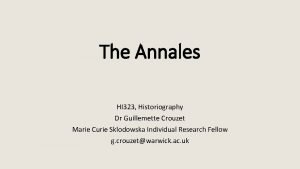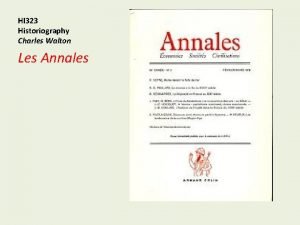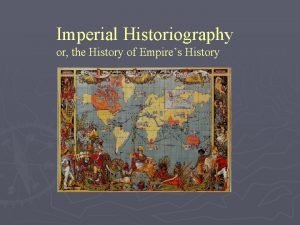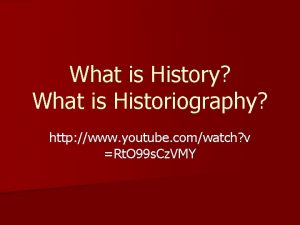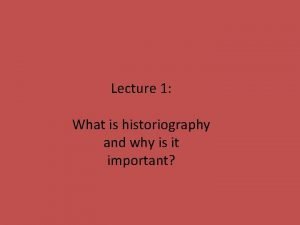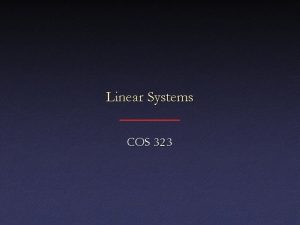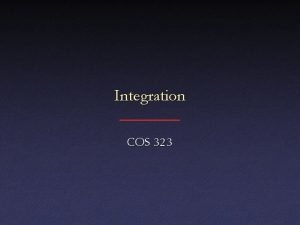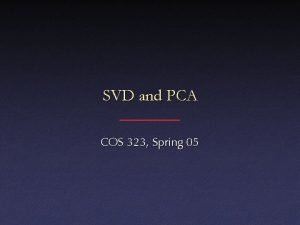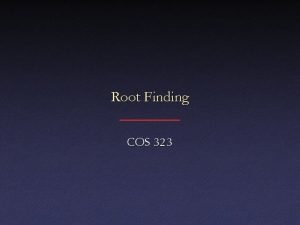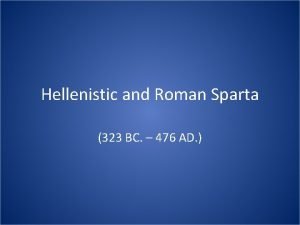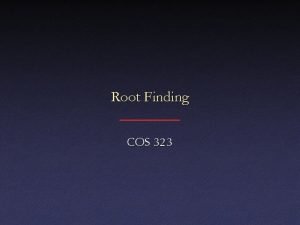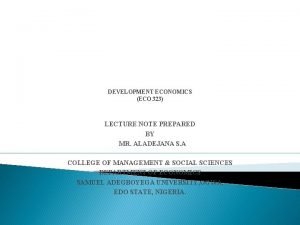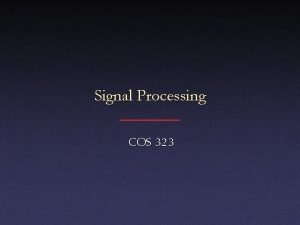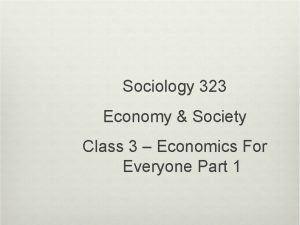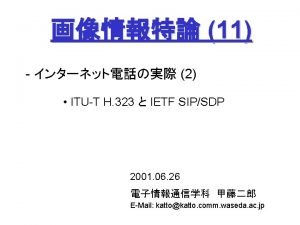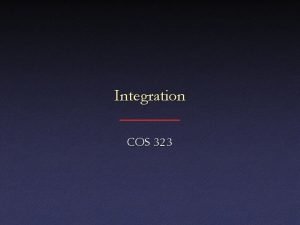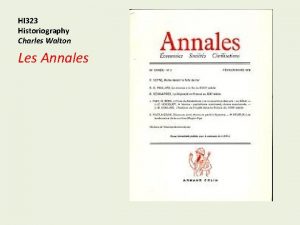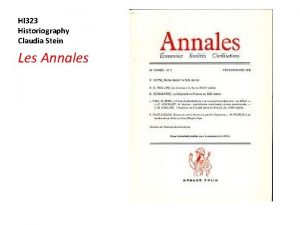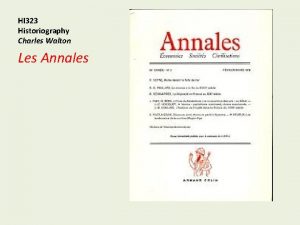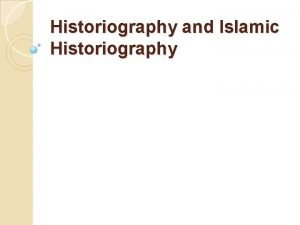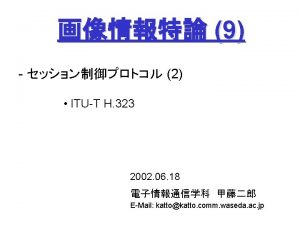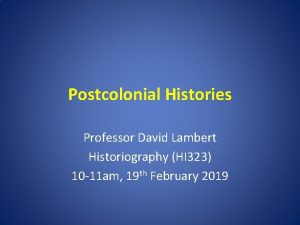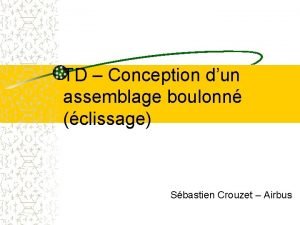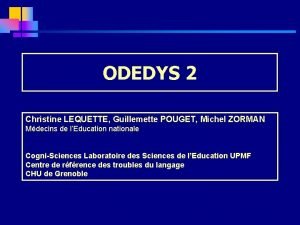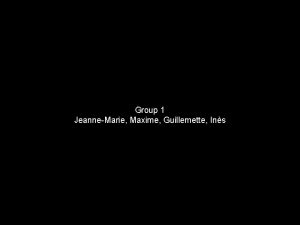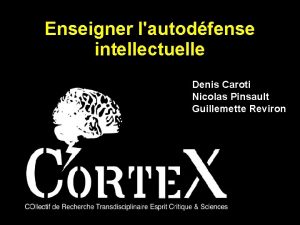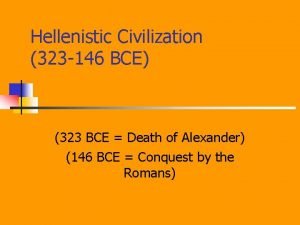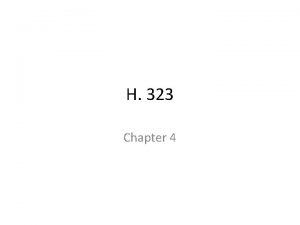The Annales HI 323 Historiography Dr Guillemette Crouzet




































- Slides: 36

The Annales HI 323, Historiography Dr Guillemette Crouzet Marie Curie Sklodowska Individual Research Fellow g. crouzet@warwick. ac. uk

Introduction and basic facts • One of the most influential approaches to thinking about and writing history • A kind of ‘revolution’ in historiography • Started in France, in the late 1920 s • Spanned most of the 20 th century, lasting for nearly 5 decades, until the late 1970 s • Has influenced historians beyond Europe, notably in America • Incredible legacy, has changed forever the way we research and teach history

Today’s lecture key questions • What was so revolutionary about the Annales? • How did this methodological revolution unfold? • What was its legacy? What is left today of the extraordinary historiographical ‘moment’ constituted by the Annales?

• I-The creation of the Annales school of history • II-The first generation of Annales scholars and their work • III-The second generation and the longerterm legacies of the Annales

I-The creation of the Annales school of history

-1929, two junior professors at Strasbourg University, in the east of France, together pioneer a new approach for academic history

Marc Bloch -Born in 1886 in a Jewish middle-class family -Very bright student -A war veteran, fought in the French armies during WW 1 -A medieval historian -Became a junior professor at Strasbourg just after WW 1 1886 -1944

Lucien Febvre -Born in 1878 in a middle-class family -Like Bloch, an exceptional student -Like Bloch, a WW 1 veteran -Also became a junior professor at Strasbourg University just after WW 1 -His research specialism was early modern France -Work focused especially on 16 th-century France 1878 -1956

1929 and the first issue of the journal, the Annales • 1929: Annales d’histoire économique et sociale

-A history journal in France, published continuously from 1929 to today -Its title would become the name also given to this new approach to history writing -After WW 2 became Annales: Economies, Société, Civilisations -In 1994: Annales: Histoire, sciences sociales -Now also published in English by Cambridge University Press

The Revolution • Broke away from “traditional” history: set itself up against the ”history of great men”, of battles and treaties, and primacy of political, military and diplomatic history • Broke away also from a history focused on events, on a short period of time, and lacking in analysis • Broke away from “histoire positiviste” (i. e. fact-listing description) • Created an “histoire problème”, geared around arguments and analysis • Focused historical analysis more on economic and social data and factors • But also centred historical analysis on mankind, e. g. people’s beliefs, ways of life, society and culture, etc

The Annales project: key words, key facts • Total history, “histoire totale”: bring together geographical, demographic, economic, social, political and cultural approaches into a single embrace. Total history: the task is to uncover all levels of human historical experience • Longue durée, historical analysis has to embrace a very long period of time, often several centuries • Interdisciplinarity: identified a need to build historical analysis in dialogue with social sciences (sociology, anthropology, ethnology, geography, etc. ) • “Serial” sources: to embrace the totality of human experience, historians have to rely on serial sources, i. e. draw on a vast documentation in the archives, classified in series (letting historians trace patterns over many years, decades)

Peter Burke on the Annales -‘The substitution of a problem-orientated analytical history for a traditional narrative of events’ -‘The history of the whole range of human activities in the place of a mainly political history’ -‘Collaboration with other disciplines’ such as geography, sociology, economics and anthropology

Influences Bloch and Febvre were deeply influenced in their critical revolution by the French school of sociology around Emile Durkheim, François Simiand Maurice Halbwachs Durkheim Halbwachs Simiand

Emile Durkheim and his work An example • Extremely prolific intellectual and writer, started a revolution a Paris at the beginning of the 20 th century. • Established sociology as a discipline • Durkheim developed a scientific approach to the study of society • Sociology as the discipline which analyses social facts • “Consist of manners of acting, thinking and feeling external to the individual, which are invested with a coercive power by virtue of which they exercise control over him” • Durkheim was interested in studying how a society is created and what holds a society together

Main themes and topics studied by Durkheim and his disciples • Collective consciousness (beliefs, norms, values), which results in social integration • Culture, as a key social fact, creates mechanical solidarity, important during social interaction • Religion= personal beliefs, the sacred, faith and religious practices, also created solidarity in society • Religion as the most fundamental social institution of humankind, and one that gave rise to other social forms • Family • Collective representations

Annales and sociology • Exploration of society, in historical perspective • Exploration of what held past societies together, including religion, collective representations, collective beliefs and norms • Smaller social units: family, village etc… • Exploration of modes of production (economic systems) • Exploration of individual beliefs as well and their influence

II- The First generation of the Annales and their work

Bloch: Sociological and anthropological inspiration -Comparative history of royal touch England France -Longue durée: historical span 11 th-18 th centuries -Not a study of kings’ magical power -But of people’s belief in this magical power (supposed to cure scrofula) -Study of society “from below” -Exploration of popular belief and religiosity -Histoire des mentalités

-Comparative history, focuses on France, but with comparisons with England, Germany and even Japan -Longue durée, long historical span, 10 -12 th centuries -Not a history of feudalism as an institution, not focused on lords, but on people and how feudalism shaped their lives -An attempt at understanding feudal society, its emergence, construction and the nature of relations between individuals

Bloch: hero of the French Resistance in the fight against Fascism • Annales published continously during WW 2 • Divergence of opinions (and historical controversy) on how to “resist” against Nazi Germany between Bloch and Febvre • Febvre continued to teach during WW 2; Bloch, as a Jew, was in an extremely difficult situation in France • Bloch wrote two books during the war, both published posthumously in 1949 • Bloch entered the French Resistance in late 1942 • Bloch arrested, tortured and executed by the Nazis in June 1944

Bloch’s last works -The Historian’s Craft: a reflection on the craft of history and on writing history -Strange Defeat: landmark in historiography. Reflection on France’s complete surrender in 1940 against German armies, which Bloch attributed to the incompetence of France’s military generals.

Lucien Febvre and the psychological approach. Towards a history of “mentalités”

The making of Lucien Febvre Like Bloch, strong focused from the beginning on social and economic facts. 1911, his doctoral dissertation was published. Remains unpublished in English. Focused on a region in the East of France during almost half of the 16 th century Test of Febvre’s methodology and the inspiration found in the social sciences Geography, sociology, ethnography Essentially a study of artisans, workers and peasants. How they lived and exploited a complex mountainous ecosystem in the early modern period. The book also charted the religious life of these social groups and paid particular attention to their beliefs but also to superstitious rituals which gave a rhythm to their daily life.

Lucien Febvre and the psychological approach. Towards a history of “mentalités” -Published in French in 1932, English in 1980 s -Not a traditional biography, not a biography of Martin Luther, the German religious reformer and theologian of the 16 th century -An attempt at understanding why Luther became the key pioneer of religious Reformation and why protestant reforms spread in Germany -Febvre based his analysis and argument on socio -economic factors. -Social and economic changes led and enabled the development of Lutheranism

-Published in French in 1937, in English in 1982 -An analysis of François Rabelais, French humanist scholar and prolific writer of the 16 th century -A response by Febvre to other studies on Rabelais which had argued that Rabelais was an atheist -Febvre argues that this was impossible given that categories of “unbelief” and “atheist” did not exist in 16 th-century France -The book is a manifesto of Febvre’s unique historical approach -Febvre argues that Rabelais had a complex approach to religion, at a time of religious reforms -Exploration of Rabelais’s imagination, beliefs and thoughts -Rabelais’s unique approach to religion can only be understood if put into the social and political context of the time

III- The Second Generation of the Annales and the legacy of a revolution

Fernand Braudel -Fernand Braudel = the key figure of the golden years of the Annales, dominant figure in French history in the 1950 s, 60 s and 70 s -Mentored by Febvre, took over as chief editor of the Annales in the 50 s -Started a second revolution in the Annales movement with his work 1902 -1985

The Mediterranean in the Age of Philip II -Braudel’s masterpiece, published in French and in English in 90 s -Epic account of time and place -The central object, character analyzed is not Philip II of Spain, but instead the Mediterranean -An attempt to write a “total history” of the Mediterranean (its peoples, geography, economic exchanges) -Interdisciplinarity, notably by its use of geography, economics, sociology but also ethnography -Strong influence also of Marxist ideology, attributing overriding importance to economic and social factors -Scope of analysis goes beyond Europe (e. g. contacts of Europe with Africa, the Middle East)

Braudel’s Mediterranean -Braudel’s passion -Explored the Mediterranean during his early years as a researcher

Braudel’s conception of time 1 -Deep or underlying structures: geographical conditions, the environment and climate, and how these shape human lives. Change is slow, only visible over the longue durée (the long run) 2 -Conjonctures: medium term trends (5, 10, 50 years): layers of social and economic activities. A middle or bridging term between (1) longue-durée structures and (3) events 3 -‘L’histoire événementielle’, factual history: history of events

Emmanuel Le Roy Ladurie • Mentored by Braudel • Le Roy Ladurie, world-renown historian • Specialist of medieval and early modern history • Embraced methodology of the Annales • Longue durée, histoire des mentalités • But also environmental history, a pioneer

The Peasants of Languedoc (1966, English) -Histoire totale (total history) of Languedoc from the 14 th to the 18 th centuries integrates political, cultural, economic, social history and environmental history -Pays particular attention to climate history and on how it shaped daily life, economics and politics. -‘Histoire immobile’ (unchanging history for centuries) with an emphasis on culture and economy.

Montaillou, 1975 -Story of a medieval town destroyed by feuds and religious strife in the early modern period -Narrower time period: half a century -Still ‘histoire totale’ with demography, beliefs, politics, economics -But focused on particular individuals (new) -Move towards micro-history (a village and some individuals)

Conclusion: the legacy of a revolution • The changes proposed and adopted by the Annales scholars may now seem trivial or obvious • But that is a measure of its success in changing the way the discipline works • The Annales have truly transformed the way we research, write and teach history • The legacy of this school of thought continues to stimulate new avenues of research and historiography

• Social and economic history developed following this revolution (e. g. influence on the British historian E. P. Thompson at Warwick, who specialized on the history of the working class) • Importance of interdisciplinarity. New inspirations from the fields of anthropology, sociology enabled the field of cultural history to develop • Focus on a given region, or a geographical area, rather than assuming that the state is the natural subject of study => this can be linked to the development of “Area Studies” • Importance of the agency of human beings, analysed in the context of their communities (village, family) => this enabled the development of microhistory. A flourishing field, notably in Italy (Carlo Ginzburg) and the USA (Nathalie Zemon-Davis) • Importance of longue durée => influences Global history, but also “deep history” or big data • Comparative history, and notably the legacy of Bloch => influenced transnational and global history writing, i. e. the study of connections and comparisons between different parts of the world
 Dr guillemette
Dr guillemette Lucien febvre
Lucien febvre Crouzet programming examples
Crouzet programming examples Deddfau uno
Deddfau uno What is historiography
What is historiography What is historiography
What is historiography What is historiography
What is historiography Autodiegetic narrator
Autodiegetic narrator Internet telephony gateway
Internet telephony gateway Elo-323
Elo-323 What is vo
What is vo Battleford minor hockey
Battleford minor hockey Cos 323
Cos 323 H 323 ports
H 323 ports H.323 vs sip
H.323 vs sip Cos 323
Cos 323 Cse 323
Cse 323 Cos 323°
Cos 323° Cos 323
Cos 323 Pc 323 barema 2020
Pc 323 barema 2020 Protocolo h.323 caracteristicas
Protocolo h.323 caracteristicas H.323 vs sip
H.323 vs sip Pag 323 n 7
Pag 323 n 7 Square root of 323
Square root of 323 Elo-323
Elo-323 Rome 323 bc
Rome 323 bc Cos 323°
Cos 323° Pill 323
Pill 323 Icao circular
Icao circular Eco 323
Eco 323 Alexander den store krig
Alexander den store krig Cecs 323
Cecs 323 Cos 323
Cos 323 Economic 323
Economic 323 Q.931
Q.931 Cos 323°
Cos 323° Hsct moscow
Hsct moscow
